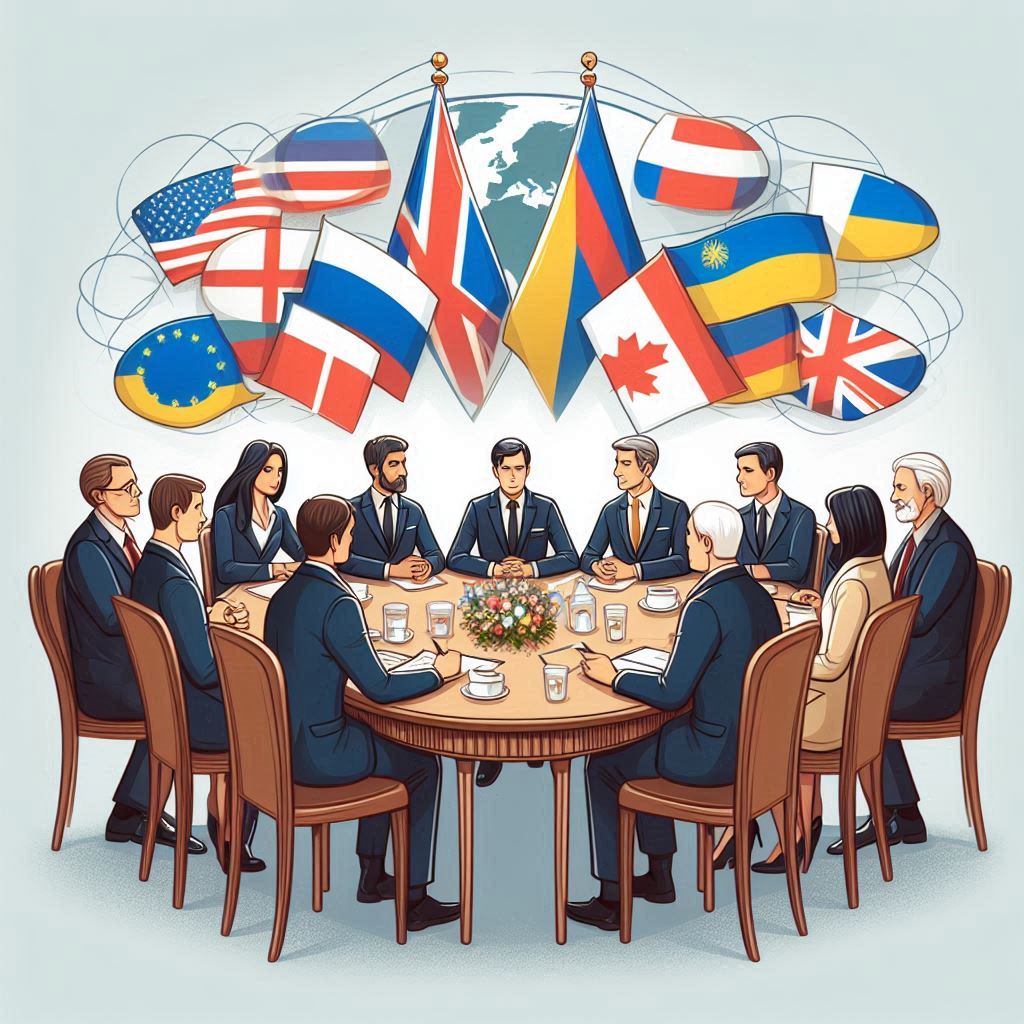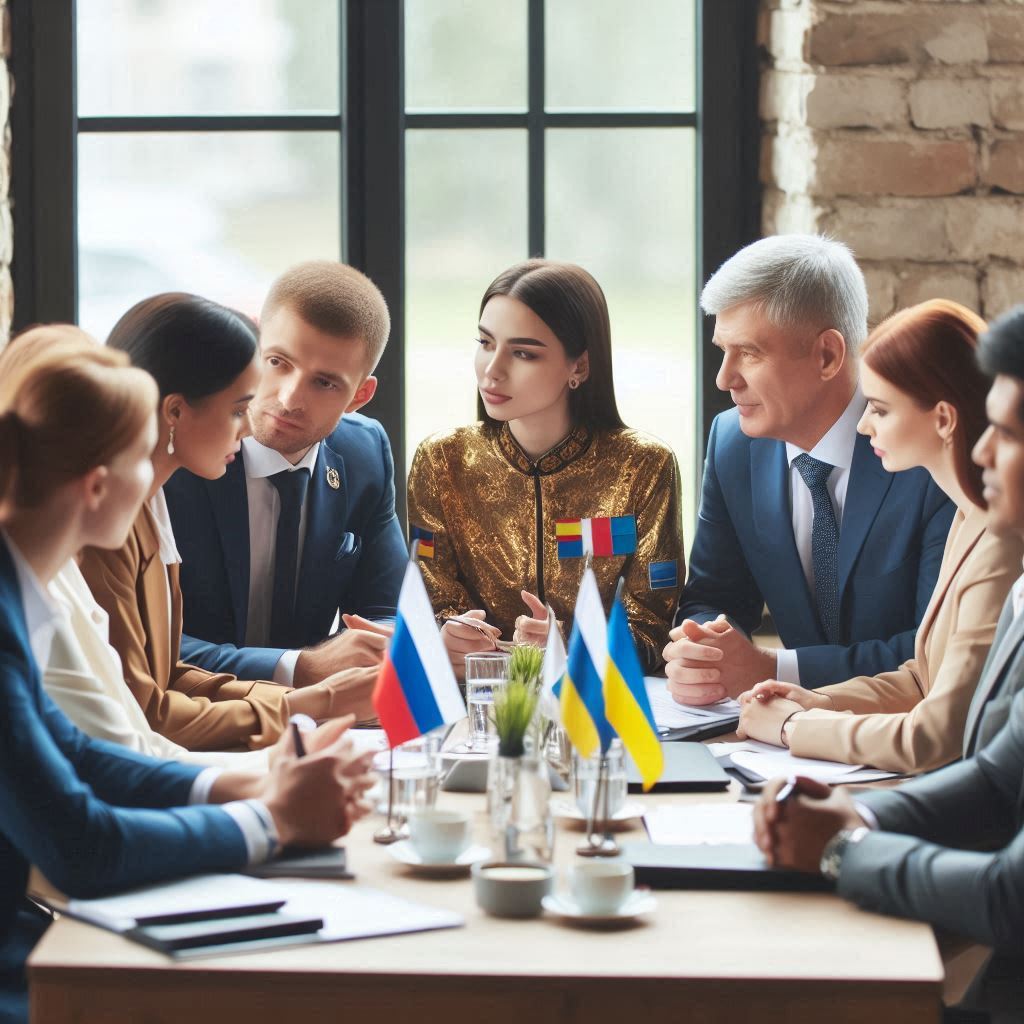俄羅斯與烏克蘭的愛恨情仇
俄羅斯與烏克蘭過去的衝突與合作是由複雜的歷史、政治和文化因素交織而成的。以下是一些關鍵的歷史事件,展現兩國之間的衝突與合作:
衝突
霍洛多莫爾(1932-1933年):這是蘇聯領導人約瑟夫·斯大林實施的集體化政策所引發的大饑荒,導致數百萬烏克蘭人死亡。擁有黑土的烏克蘭,長年盛產農作物,卻被蘇聯強行徵收食物導致悲劇發生,還發生大暴動,許多人逃往波蘭。對質疑蘇聯政策的人民則被送到哈薩克及西伯利亞自生自滅,烏克蘭視此事件為種族滅絕,每年都舉辦紀念活動,這對兩國關係造成長期的創傷。
蘇聯解體(1991年):隨著蘇聯的解體,烏克蘭舉辦獨立公投,最終以92.3%的支持率在1991年宣佈獨立。此後,烏克蘭致力於擺脫俄羅斯的影響,尋求更緊密的歐洲和西方聯繫,這引發俄羅斯的不滿和緊張關係。因為在許多俄羅斯人從小的教育灌輸,白俄羅斯與烏克蘭都是屬於他們的領土或是可控制的國家,而他們是斯拉夫民族的領導者。
橙色革命(2004-2005年):烏克蘭的親西方勢力與親俄勢力之間的政治鬥爭引發一場大規模的政治危機。最終,親西方的維克多·尤先科成為總統,這使烏克蘭與俄羅斯的關係更加緊張。但後來因為經濟問題無法解決導致嚴重的通貨膨脹,稅收減少讓政府與學校幾乎無法正常運作,後來的選舉輸給親俄的亞努科維奇。
克里米亞危機(2014年):俄羅斯吞併克里米亞並支持烏克蘭東部的親俄分離主義者,導致烏克蘭東部地區爆發武裝衝突。這一事件極大地惡化兩國關係,並引發國際制裁和長期的地緣政治緊張局勢。
俄烏戰爭(2022年):2022年2月,俄羅斯對烏克蘭發動全面侵略戰爭,進一步加劇兩國之間的敵對狀態。這場戰爭導致大量人員傷亡和破壞,並使國際社會對俄羅斯施加更嚴厲的制裁。
合作
基輔羅斯時期(9-13世紀):基輔羅斯是現代俄羅斯和烏克蘭共同的歷史起源。這段時期兩國有著共同的文化和宗教根基,奠定長期的聯繫。在11世紀基輔羅斯是歐洲最大的國家。
哥薩克時代(17世紀):在17世紀,烏克蘭哥薩克在博赫丹·赫梅利尼茨基的領導下反抗波蘭統治,並尋求俄羅斯的支持,雖然成功獨立,但後來國內發生內鬨,最終成為沙俄的附庸。
蘇聯時期(1922-1991年):烏克蘭作為蘇聯的一部分,與俄羅斯有著緊密的經濟、政治和文化聯繫。在這段時期,兩國共同發展工業和科技,尤其是在航空航天和軍事技術領域。當初克里米亞島屬於俄羅斯,後來割讓給烏克蘭管理,在2014年普丁的下令下,俄羅斯沒有發射一發子彈便成功強行佔領。
天然氣供應合作:蘇聯解體後,俄羅斯和烏克蘭在能源領域保持合作。俄羅斯是烏克蘭的主要天然氣供應國,而烏克蘭是俄羅斯天然氣運往歐洲的主要過境國。然而,這種合作也經常因價格和供應條件問題而產生糾紛。因為戰爭德國被迫中止與俄羅斯的海底油管的合作,未來俄羅斯的天然氣運輸仍要透過白俄羅斯與烏克蘭的管線。即使目前兩國仍在交戰,在冬天的時候俄羅斯仍要支付烏克蘭高昂的管線運輸費。之前兩國關係良好時,烏克蘭使用的天然氣相當低廉,因此物價也相當穩定。
文化交流:儘管存在政治和經濟上的衝突,兩國之間的文化交流仍然頻繁。許多烏克蘭人和俄羅斯人有親屬關係,並在文學、藝術和音樂領域保持著交流。除烏克蘭以外,俄羅斯是最多烏克蘭人居住的國家,其次是加拿大。許多俄羅斯領導或是高官,都有烏克蘭血統。
俄羅斯和烏克蘭之間的關係複雜且多變,既有深厚的歷史文化聯繫,也有嚴重的政治和軍事對立。主要的問題在於烏克蘭想要擺脫俄羅斯的長期控制,試圖與西方國家有更多的經貿往來,並企圖加入北約跟歐盟,但因本身經濟實力太弱,無法像芬蘭與瑞典一樣快速加入這些組織,而俄羅斯不希望國境周邊都佈滿北約的軍事設備,依照過去輕易拿下克里米亞的經驗,嚴重誤判烏克蘭的反抗能力,因此爆發2022年全面入侵的戰爭。理解他們之間的歷史,有助於更全面地認識當前兩國關係的現狀及其未來發展的可能性。
The past conflicts and cooperation between Russia and Ukraine are intertwined with complex historical, political, and cultural factors. Here are some key historical events that illustrate the conflicts and cooperation between the two countries:
Conflicts
Holodomor (1932-1933):
This was a massive famine caused by the collectivization policies implemented by Soviet leader Joseph Stalin, resulting in the deaths of millions of Ukrainians. Ukraine, with its fertile black soil, had long been a major producer of agricultural products but was forcibly deprived of food by the Soviets, leading to this tragedy. This caused widespread uprisings and many people fled to Poland. Those who questioned Soviet policies were sent to Kazakhstan and Siberia to fend for themselves. Ukraine considers this event a genocide and holds annual commemorations, leaving a lasting scar on the relations between the two countries.
Dissolution of the Soviet Union (1991):
Following the dissolution of the Soviet Union, Ukraine held a referendum for independence and declared independence in 1991 with 92.3% support. Since then, Ukraine has strived to free itself from Russian influence and seek closer ties with Europe and the West, causing dissatisfaction and tension with Russia. Many Russians, due to their upbringing, believed that Belarus and Ukraine were part of their territory or controllable countries and saw themselves as the leaders of the Slavic people.
Orange Revolution (2004-2005):
The political struggle between pro-Western and pro-Russian forces in Ukraine led to a large-scale political crisis. Eventually, the pro-Western Viktor Yushchenko became president, straining relations with Russia. However, economic issues later led to severe inflation, reduced tax revenue, and almost non-functional government and schools, resulting in the election of the pro-Russian Viktor Yanukovych.
Crimea Crisis (2014):
Russia annexed Crimea and supported pro-Russian separatists in eastern Ukraine, leading to armed conflict in the region. This event greatly deteriorated relations between the two countries and resulted in international sanctions and long-term geopolitical tensions.
Russo-Ukrainian War (2022):
In February 2022, Russia launched a full-scale invasion of Ukraine, further escalating hostilities between the two nations. This war has caused significant casualties and destruction, leading to more severe international sanctions against Russia.
Cooperation
Kievan Rus' Period (9th-13th Century):
Kievan Rus' is the common historical origin of modern Russia and Ukraine. During this period, the two countries shared cultural and religious foundations, establishing long-term connections. In the 11th century, Kievan Rus' was the largest country in Europe.
Cossack Era (17th Century):
In the 17th century, Ukrainian Cossacks, under the leadership of Bohdan Khmelnytsky, rebelled against Polish rule and sought support from Russia. Although they achieved independence, internal conflicts later led to Ukraine becoming a vassal of Tsarist Russia.
Soviet Period (1922-1991):
As part of the Soviet Union, Ukraine had close economic, political, and cultural ties with Russia. During this period, the two countries jointly developed industry and technology, especially in the fields of aerospace and military technology. Initially, Crimea belonged to Russia but was later ceded to Ukraine for administration. In 2014, under Putin's orders, Russia forcibly occupied Crimea without firing a single shot.
Natural Gas Supply Cooperation:
After the dissolution of the Soviet Union, Russia and Ukraine maintained cooperation in the energy sector. Russia was the main supplier of natural gas to Ukraine, and Ukraine was the primary transit country for Russian natural gas to Europe. However, this cooperation often faced disputes over pricing and supply conditions. Due to the war, Germany was forced to halt its cooperation with Russia on the undersea pipeline, making future Russian natural gas transport reliant on pipelines through Belarus and Ukraine. Despite the ongoing conflict, Russia still has to pay Ukraine high transit fees during the winter. When relations were good, Ukraine enjoyed low natural gas prices, keeping the cost of living stable.
Cultural Exchange:
Despite political and economic conflicts, cultural exchanges between the two countries have remained frequent. Many Ukrainians and Russians have familial ties and maintain exchanges in literature, art, and music. Besides Ukraine, Russia hosts the largest population of Ukrainians, followed by Canada. Many Russian leaders and officials have Ukrainian heritage.
Summary
The relationship between Russia and Ukraine is complex and dynamic, characterized by deep historical and cultural ties as well as severe political and military conflicts. The main issue lies in Ukraine's desire to break free from long-term Russian control, seek more economic and trade relations with Western countries, and attempt to join NATO and the EU. However, due to its weak economic strength, Ukraine cannot join these organizations as quickly as Finland and Sweden. Russia does not want NATO military equipment surrounding its borders and, based on the past easy annexation of Crimea, severely misjudged Ukraine's resistance capabilities, leading to the full-scale invasion in 2022. Understanding their history helps to comprehensively grasp the current state of relations between the two countries and their potential future developments.


照片:DALLE3
- 1
- 2
- 3
- 4
